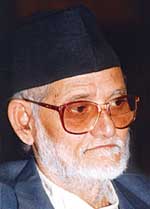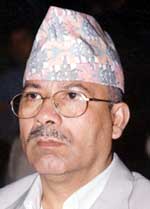Sushil Koirala, general secretary of the Nepali Congress and Madhab Kumar Nepal, general secretary of the CPN (UML) explain their party stands on various subjects. Extracts:  On the ineffectiveness of parties' movement
On the ineffectiveness of parties' movement
Sushil Koirala: We planned to gather nearly 700,000 people in the capital but had to call it off. If we had no support from the people, the government would not have banned public protest and kept people from travelling to Kathmandu. Later, there was no point carrying on with the protest programs during Dasai, Tihar and Chhath. But now the movement will go ahead. Our party president's visit to villages is an indication towards that end.
Madhab Kumar Nepal: There has been some delay in preparing the protest programs. We need to discuss the effectiveness of the movement and are trying to discuss how we can generate more support from the people, see what needs to be added and done away with in our agitation. We are also considering involving other parties in the movement.
On party unity
SK: There may be some competition among parties but when it comes to saving democracy, we are all united. There is no difference on that front.
MKN: We have no such vested interests now. I was unilaterally nominated for the post of prime minister of an all-party government. At present we have not made any claims that the position of prime minister should come to our party. All we want is the political reins to be in the hands of the political parties.  On the state of democracy
On the state of democracy
SK: Regression has advanced by dangling tags of democracy and constitutional monarchy. The two terms have become an eyewash. But, in this age of democracy, freedom and rule of law, the conspiracy to impose a dictatorship will not be accepted by the people and the parties.
MKN: Certainly, the fight for democracy seems long and difficult. The government's stress on militarisation has really complicated matters. We see clearly that the idea is to add more soldiers and rule the country with the help of military force. This is why we have no alternative but a serious fight for democracy.
On the role of the king
SK: The king may have based himself on the army. Some other forces may also have assured him of their support but there is a fundamental difference in the army of yesterday and today. Now they are educated and understand society and the world. I don't believe that the king has international support. India, the US, the UK and the EU all back Nepal's parliamentary democracy and the role of political parties in a constitutional monarchy.
MKN: Fourth October last year was the genesis of this regression. The king's claim that state power lies within him challenged the notion that it actually resides in the people. Hence, the move was unconstitutional. The royal interference that began with the appointment of a prime minister has spread its tentacles to simple issues like transferring bureaucrats. And now, we see the Raj Parishad being used against political parties. This makes it clear that the campaign to weaken multiparty democracy is already on.


